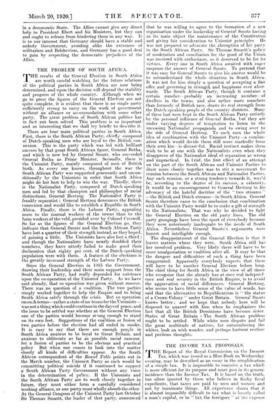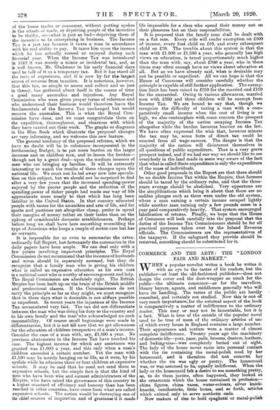THE INCOME TAX PROPOSALS. T HE Report of the Royal Commission
on the Income Tax, which was issued as a Blue Book on Wednesday evening, may be described as an essay in the simplification of a siniple tax. It is impossible to conceive a tax which is more efficient for its purpose and more just in its general incidence than the Income Tax. It is based on the truth, too often ignored by those who believe in flashy fiscal expedients, that taxes are paid by men and women and not by inanimate things. All experience shows that it is almost impossibly difficult to tax what is loosely called a man's capital, or to " tax the foreigner " at the expense of the home trader or consumer, without putting spokes in the wheels of trade, or depriving people of the incentive to be thrifty, or—what is just as bad—depriving them of the incentive to be enterprising in business. The Income Tax is a just tax because it taxes a man in accordance with his real ability to pay. It taxes him upon the income which he has actually earned or enjoyed during each financial year. When the Income Tax was introduced in 1842 it was merely a minor or incidental tax, and, as is well known, Mr. Gladstone in his early financial days used to talk of it as a temporary tax. But it has stood all the tests of experience, and it is now by far the largest source of revenue from taxation. It is notorious, however, that this tax, so simple to assess and collect and so just in theory, has gathered about itself in the course of time a good many anomalies and injustices. Any Royal Commission who were given proper terms of reference and who understood their business would therefore leave the fundamentals of the Income Tax unchanged but would remove the anomalies. This is what the Royal Com- mission have done, and we must congratulate them on the expedition, thoroughness, and clearness with which they have carried out their work. The graphs or diagrams in the Blue Book which illustrate the proposed changes are very informing, and we welcome this new feature. The general tendency of the proposed reforms, which we have no doubt will be in substance incorporated in the forthcoming Budget, is to put more burden on the larger incomes and on childless men, and to lessen the burden— though not by a great deal—upon the medium incomes of men who are bringing up families. It will be extremely interesting to watch the results of these changes upon the national life. We must not be led away now into specula- tion on this subject, but we should not be surprised to find after a very few years that the increased spending-power enjoyed by the poorer people and the reduction of the spending-power of richer people had made our way of life approximate more nearly to that which has long been familiar in the United States. In that country educated people with tastes for the amenities and arts of life, and for sports and pastimes not altogether cheap, prefer to spend their margins of money rather on their tastes than on the upkeep of considerable domestic establishments. Perhaps before long we shall have here something resembling the type of American who keeps a couple of motor-cars but has no servants.
It is impossible for us even to summarize the extra- ordinarily full Report, but fortunately the summaries in the daily papers have been ample. We can deal only with a few points involving important principles. The Royal Commission do not recommend that the incomes of husbands and wives should be separately assessed, but they do recognize that a family man who is giving his children what is called an expensive education at his own cost is a national asset who is worthy of encouragement and help. The Royal Commission are absolutely right. The British Empire has been built up on the brain of the British middle and, professional classes. If the Commissioners do not earry the principle so far as they might, we must recognize that in these days what is desirable is not aldfays possible or expedient. In recent years the injustices of the Income Tax accumulated very fast. The tax did not differentiate between the man who was doing his duty to the country and to his own family and the man'who acknowledged no such responsibility. Of course small beginnings were made in differentiation, but it is not till now that we get allowances for the education of children irrespective of a man's income. Consider the case of a man With, say, £1,500 a year. No previous abatements in the Income Tax have touched his ease. The highest income for which any assistance was granted was £1,000 a year, and this only when a man's children exceeded a certain number. Yet the man with £1,500 may be merely hanging on to life, as it were, by his eyelids while he educates three or four children at expensive schools. It may be said that he need not send them to expensive schools, but the simple fact is that the kind of men who have been wise and earnest administrators of the Empire, who have raised the governance of this country to a higher standard of efficiency and honesty than has been i reached in other countries, have come from what are called expensive schools. The nation would be destroying one of its chief sources of inspiration and of greatness if it made life impossible for a class who spend their money not on their pleasures but on their responsibilities. It is proposed that the family man shall be dealt with on a flat rate. Every wife will confer exemption on £100 of income, every first child on £40, and every subsequent child on £30. The trouble about this system is that the man with £1.000 or £1,500 a year, who generally has high views on education, is taxed proportionately much higher than the man with, say, about £300 a year, who in these times may often enough have no views about education at all. But as we have already said, what is desirable may not be possible or expedient. All we can hope is that the House of Commons will consider carefully whether the principle is capable of still further application. The exemp- tion limit has been raised to £250 for the married and £150 for the unmarried. Owing to various allowances, married men with £350 and three children will be exempt from Income Tax. We are bound to say that, though we recognize the difficulty of taxing a man with a com- paratively small income when the cost of living is so high, we also contemplate with some concern the prospect of the majority of the nation escaping Income Tax altogether while the burden becomes heavier on the few.
We have often expressed the wish that, however minute the tax may be, some form of direct tax could be exacted from all wage-earners. The danger is that the majority of the nation will disinterest themselves in all questions of public expenditure. That is a very grave prospect indeed, and if we had our way we should like to see everybody in the land made in some way aware of the fact that what is called State expenditure is only the expenditure of the mass of individuals.
Other good proposals in the Report are that there should be no double Income Tax within the Empire, that farmers should be taxed by the ordinary rules, and that the three- years average should be abolished. Very opportune are the simplifications which bring it about that there are no sudden plunges such as there were under the old system, where a man earning a certain income escaped lightly while another man earning only a few pounds more in a year paid comparatively heavily. That system encouraged falsification of returns. Finally, we hope that the House of Commons will look carefully into the proposal that the duties of the Income Tax Commissioners should be for all practical purposes taken over by the Inland Revenue officials. The Commissioners are the representatives of the taxpayer. If the safeguard they provide should be removed, something should be substituted for it.





































 Previous page
Previous page